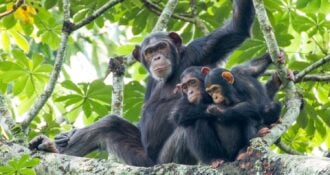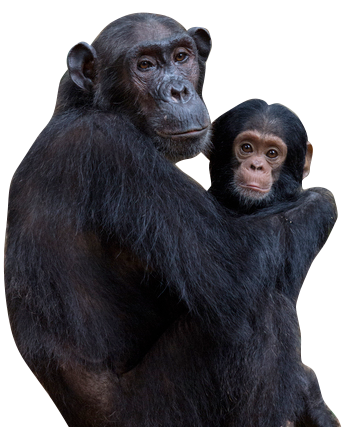
Strong social ties are a key driver of cooperation in many species and are associated with adaptive benefits in several of them, including humans, feral horses and dolphins. Although such bonds are widely observed, it is not always known why any two particular animals become friends (just as in humans).
In a recently published article, Leakey Foundation grantees Joel Bray and Ian Gilby, both from Arizona State University, used long-term observational studies of chimpanzees at Gombe National Park in Tanzania to analyze what factors explain partner choice and cooperation in male chimpanzees. Gilby is a research affiliate with the ASU Institute of Human Origins and an associate professor with the School of Human Evolution and Social Change. He is also the convener of the Gombe Research Consortium, which manages six decades of detailed behavioral, ecological and demographic data from the long-term study of two chimpanzee communities at Gombe.
“We extracted and analyzed almost 40 years of behavioral data. So, for many males we had complete records of their friendships from the day they entered adulthood to the day they died,” said Bray, who spent a year living at Gombe and observing chimpanzees in the wild.
Read about Joel Bray’s time at Gombe in their “From the Field” blog post.

Bray and Gilby found that male chimpanzees formed friendships lasting up to 13 years. Maternal brothers formed the strongest bonds, but overall, only a small number of close bonds among adult male chimpanzees were explained by kinship.
Although all male chimpanzees remain in the social group they were born in, slow reproductive rates combined with high infant mortality and a 50-50 sex ratio mean that few males have maternal brothers in their group. Whether males can recognize their paternal half-brothers is an open research question, but current evidence from other study sites suggests they cannot.

Beyond kinship, there was no clear predictor of which males formed friendships. For example, males of similar age and rank were also not more likely to associate, which suggests that bond strength results from a more complex process than a simple accounting of basic characteristics.
These results contrast with findings in other species that form strong social bonds. So, what explains partner choice in male chimpanzee friendships? Based on studies in other species and captive chimpanzees, the researchers suggest that it could be compatible personalities, which is an area for further research although no final conclusions can be made at this point.
“Understanding chimpanzee friendship gives us insight into the evolution of cooperation and friendship in humans, and how cooperation evolves in the absence of factors such as kinship,” Gilby said.
Bray, J., Gilby, I.C. Social relationships among adult male chimpanzees (Pan troglodytes schweinfurthii): variation in the strength and quality of social bonds. Behav Ecol Sociobiol 74, 112 (2020). https://doi.org/10.1007/s00265-020-02892-3
By Julie Russ
Assistant director, Institute of Human Origins, Arizona State University






Comments 0